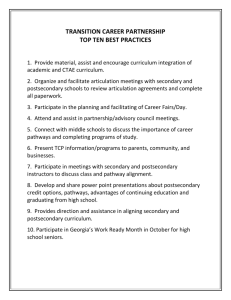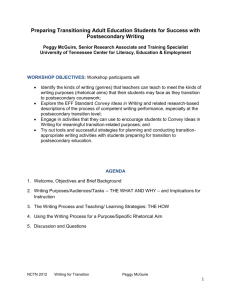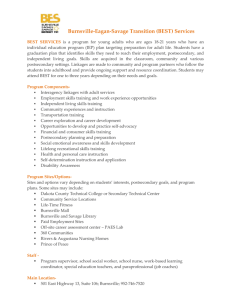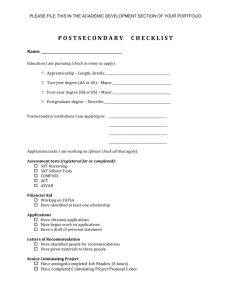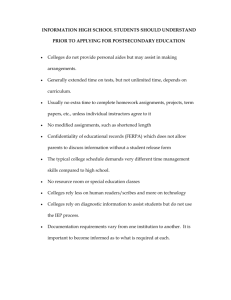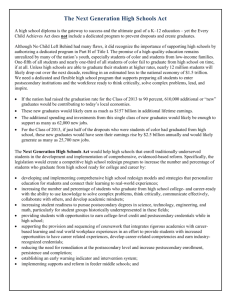what does it mean to be college and career ready?
advertisement
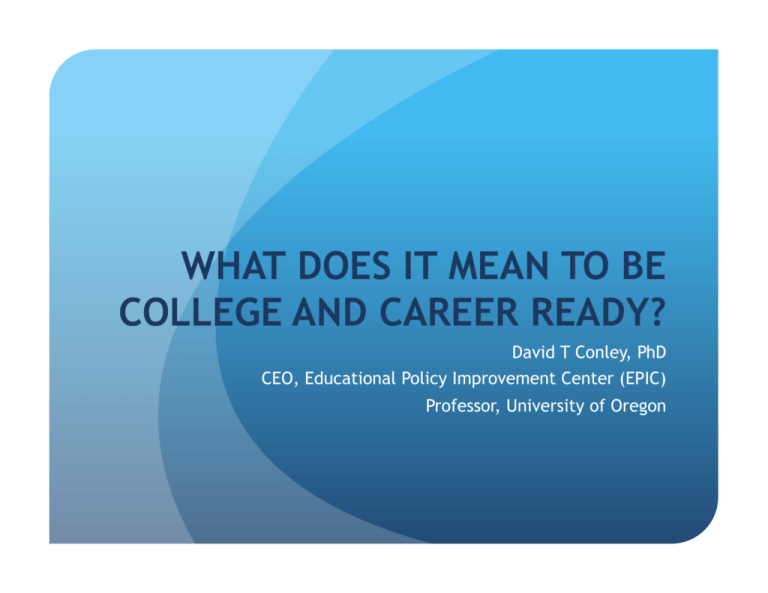
WHAT DOES IT MEAN TO BE COLLEGE AND CAREER READY? David T Conley, PhD CEO, Educational Policy Improvement Center (EPIC) Professor, University of Oregon ENORMITY OF THE CHALLENGE The larger goal of college and career readiness requires schools to enable all students to master core content develop key cognitive strategies take ownership of their learning and become proficient with a range of learning strategies acquire the privileged knowledge necessary to make a successful transition from secondary to postsecondary education. This is a lot to accomplish when most of the focus currently is on getting students to pass English and math tests. 3 College readiness is a CONTINUUM Not Ready Partially Ready Ready 4 think: Problem Formulation Research Interpretation Communication Precision & Accuracy go: Postsecondary Awareness Postsecondary Costs Matriculation Career Awareness Role and Identity Self-advocacy know: Key Cognitive Strategies Key Content Knowledge Key Transition Knowledge and Skills Key Learning Skills and Techniques Structure of Knowledge Challenge Level Value Attribution Effort act: Ownership of Learning Learning Techniques 4 THE KEY COGNITIVE STRATEGIES 5 6 KEY CONTENT KNOWLEDGE: THE COMMON CORE STATE STANDARDS § Are the CCSS an accurate statement of college and career readiness? § EPIC recruited ~2,000 postsecondary instructors in 25 different course areas to judge each standard on applicability and importance. § Courses included 14 commonly associated with general education requirements and 11 found in more career-oriented postsecondary programs. § Instructors rated ELA/Language and Math standards overall as applicable and important. § Almost all stated the CCSS were cognitively challenging. § Comments were largely positive. § Download report from: www.epiconline.org KEY LEARNING SKILLS Ownership of Learning! Know Yourself • Be self-aware. Find out your interests, passions, skills, and ambitions. Set Goals • Know what you need to achieve based on self-awareness. Be Motivated • Have the mindset to achieve your goals. Persist • Don’t give up, especially when something does not come as easily to you. Monitor Performance • Know how well you are really doing. Gauge your true skill level. Ask for Help • Know when you are stuck, then get help. Don’t view this as a weakness. Show Self-Efficacy • Learn how to control the things you can control. Then, control them. KEY LEARNING TECHNIQUES 8 Manage Time Take Notes Study for Tests Memorize Read Strategically Learn Collaboratively Use Technology 9 KEY TRANSITION KNOWLEDGE & SKILLS Postsecondary Awareness Postsecondary Aspiration Postsecondary Norms & Culture Career Awareness Postsecondary Costs Tuition Awareness Financial Aid Awareness Role & Identity Career Options Career Requirements Role Identity Role Conflict Career Readiness Role Models Matriculation Postsecondary Eligibility Admissions Procedures Program Selection Self-Advocacy Resource Acquisition Institutional Advocacy DO’S AND DON’TS OF ALIGNING THE SYSTEMS DO… create opportunities for secondary and postsecondary faculty to create common understanding of and meaning for the standards. get secondary students more information earlier on their readiness in each of the four key areas. collect and use a wider range of data, not just what is measured by fixed-format tests. encourage and assess deeper learning and performance. infuse the CCSS ELA/Language and math standards into multiple subject areas. provide training to teachers on how to develop key cognitive strategies through more complex assignments. DO’S AND DON’TS OF ALIGNING THE SYSTEMS DON’T… rely entirely on a cut score on a single English and math test for any high-stakes decisions for individual students. assume all students need exactly the same knowledge and skills to be ready to succeed in the wide range of programs and majors available in postsecondary education. create a distinction between the fundamental knowledge and skills needed for careers and for college. forget that this is ultimately a human endeavor and that people need time to understand what is expected of them and to evolve their definition of college and career ready. FOR MORE INFORMATION: contact@epiconline.org http://www.epiconline.org
